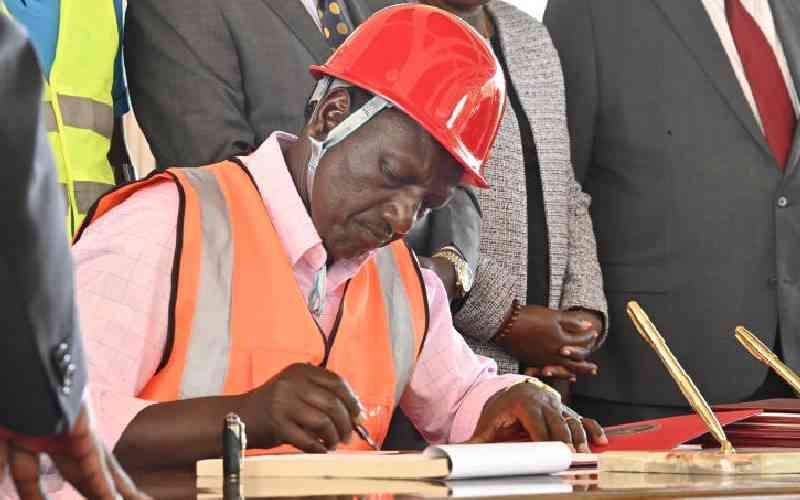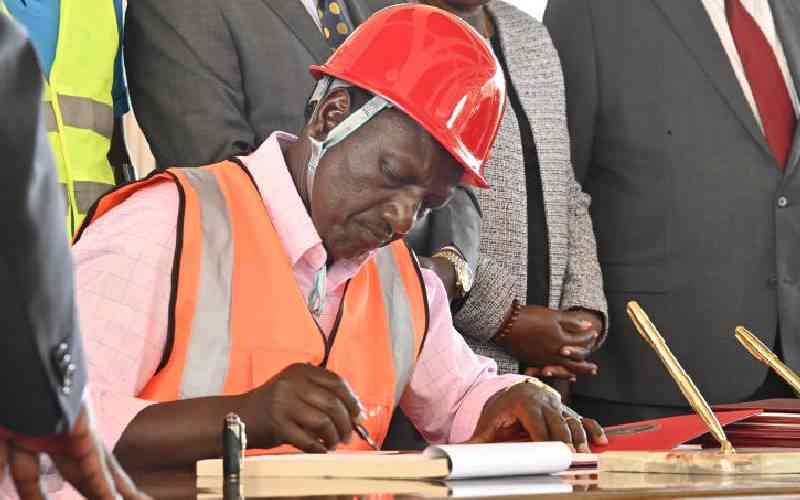
When President William Ruto out-muscled and outmanoeuvred Azimio la Umoja coalition after the 2022 General Election, he expected to have a smooth presidency with muted dissent from the Opposition. But this has not been the case.
As he outlined his government’s plan towards attaining the Vision 2030 goals, the Head of State resorted to a now familiar line, delivered whenever his pet projects have faced defeats in court.
His detractors, Dr Ruto suggested on Thursday, were bribe-takers who thrived in blackmail. The Head of State cut a frustrated figure, a far cry from the triumphant look he should have worn, having just signed the Affordable Housing Act into law.
On that very day, the High Court declined to temporarily halt the controversial 1.5 per cent pay deduction to fund Ruto’s affordable housing plan – another victory for the president.
But recent experience has taught him not to rest easy until the Judiciary approves his policies. The new housing law, a product of the High Court’s nullification of sections of the Finance Act 2023, is facing court challenges.
The president has not been as successful in court as he has in Parliament. Indeed, courtesy of his control over Parliament, the Affordable Housing Bill sailed easily through the bicameral House. As they had done previously, Ruto’s troops subdued whatever opposition the Azimio la Umoja-One Kenya coalition party had mounted.
From the start, it was always clear that Ruto had a fine strategy to have his way in Parliament, which mostly involved wooing opposition lawmakers into his Kenya Kwanza Alliance.
Bolstered by his numerical advantage, he would say he wanted a “strong opposition” to check the government’s excesses. And he was, seemingly, prepared for them, having observed their most preferred strategies.
In the face of Opposition demonstrations, Ruto unleashed a strong police reaction, faulted in some quarters for their heavy-handedness. In Parliament, he was assured of victory even in the most inconsequential of debates.
However, the president seems ill-prepared for the kind of opposition he faces, coming from all corners. On one end is the civil society, which has been eager to test the constitutionality of the president’s policies.
Seasoned public-interest litigants, such as Busia Senator Okiya Omtatah, and the Law Society of Kenya are also hitting hard, forcing the government back to the drawing board.
Besides the nullification of the housing levy that forced Ruto into establishing a new law, the courts also quashed his appointment of chief administrative secretaries (CASs). Parliament is processing a Bill that could see the president appoint an unlimited number of CASs, which could attract another legal battle.
The High Court also recently quashed the deployment of police officers to Haiti. Ruto’s losses in court also include conservatory orders issued against his projects in several instances, such as the one suspending the implementation of the new Social Health Insurance Fund programme, which was lifted in January.
Nursing the court defeats, the president went on an attack against judicial officers, whom he accused of receiving bribes to frustrate his projects, claims he rephrased recently.
Stay informed. Subscribe to our newsletter
“The tragedy is that even those who go to challenge government policies in our courts… that after they have obtained stays and injunctions, whether it is housing or universal healthcare coverage plan, they have the audacity and temerity to come and look for government officials telling them that ‘if you talk to us nicely, we are going to remove the injunction’,” Ruto said recently.
Omtatah, who has previously faced threats owing to his public-interest litigation work, wondered why the president was making such claims.
“I don’t know what the president knows or means. Since it takes two to tango, I don’t know who approached whom. What matters to me is that I have not filed my petition. So I cannot be a suspect. Let the president shut up and defend the cases against the Affordable Housing Act,” said Omtatah.
Nairobi Senator Edwin Sifuna also faulted the president’s remarks. “He needs to provide evidence of this blackmail. He has threatened people who have filed cases before and now he is turning around to allege things without evidence,” said Sifuna.
The previous public feud prompted a meeting with Chief Justice Martha Koome to reduce hostilities between their arms of government.
While Ruto may have construed the truce to mean the courts would play ball, as he suggested that the Executive and Judiciary had agreed on his housing plan, Koome has insisted that her arm of government would remain independent.
“The Judiciary is not, in any capacity, able to enter into any agreement with the Executive, especially in a matter that is before court,” Koome said on Thursday.
The president should have known that he was bound to face hurdles in court, having served as deputy president in a government that was constantly sued for alleged constitutional breaches.
University don Herman Manyora notes that while sustained litigation comes as no surprise to Ruto, the president is grappling with the reality that people would openly challenge him.
“From the way he speaks, he seems surprised that people have the guts to do what they are doing – that they can dare challenge him,” says Manyora, who urges the Head of State to “do the right thing”.
“He should follow the Constitution and maintain fidelity to the rule of law. He should appreciate that the 2010 Constitution grants citizens certain rights. Equally important, he should negotiate with different groups because politics is all about negotiations,” he adds.
Ruto is also facing dissent outside the courts. For instance, the clergy has come out strongly to oppose certain government policies, issuing stinging statements against the housing levy and the high cost of living.
In recent months, many have predicted the “return of the Church”, referencing the vocal role it played in championing democracy and respect for human rights during the 1980s and 1990s.
The public, too, is rallying together to oppose unfavourable policies. Avocado farmers in Mt Kenya region have recently opposed new taxes, forcing their leaders into a tactical retreat. Now the government has been forced to relook at the contentious clauses of the Finance Act which require farmers to issue tax receipts and pay a 5 per cent tax.
Across the country, many more are voicing their dissent against the high cost of living and government wastage, some through Bunge la Mwananchi forums even as others heckle during presidential functions. Ruto’s response has been to sustain engagements with the masses.
And Azimio is also maintaining the pressure on the government. When Ruto said he supported former PM Raila Odinga to chair the African Union Commission, the expectation by many was that the opposition would go easy on him as it had when Raila shook hands with former President Uhuru Kenyatta.
Indeed, Ruto and Raila are believed to be in a secret arrangement and have the National Dialogue Committee (Nadco) report tying their interests. But the opposition has not gone slow on the government, calling them out at every turn. On Friday, National Assembly Minority Leader Opiyo Wandayi questioned Ruto’s commitment to bringing to book those involved in the unfolding fertiliser scandal.
Wiper Leader Kalonzo Musyoka, who co-chaired Nadco alongside National Assembly Majority Leader Kimani Ichung’wah, recently warned of a return of anti-government protests if the cost of living stayed high.
Manyora believes that Ruto is feeling the heat of all these factors, hence his strong reaction. “If (the late former President Daniel) Moi felt the heat, who is he not to? He cannot be stronger than Moi,” he said.

Leave a Reply